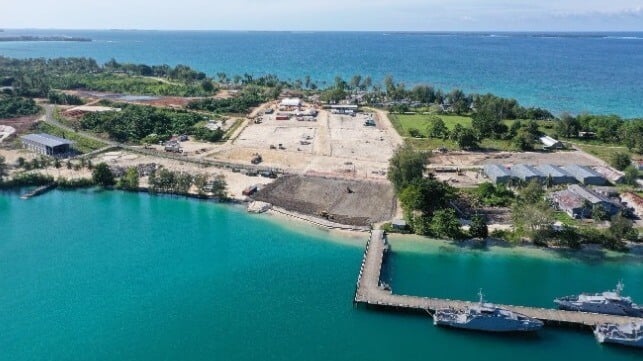Opinion: U.S. Should Not Waver on Ties to Strategic Pacific Islands

After more than four years of negotiation, economic assistance funding has been approved under the Compacts of Association, the agreements that govern US relations with Marshall Islands, Palau and the Federated States of Micronesia. But will US policymakers, diplomats and legislators stay focused on engaging with those and other Pacific island countries? Or will attention fade?
Renewed Compact funding is not an end in itself, especially as China pursues strategic objectives across the Pacific. Given the strategic environment, the United States cannot walk away from continued focus on the Pacific Islands.
The Good
Since 2018 the US has not only negotiated a new tranche of funding for the three Freely Associated States under the compacts. It has also has worked with Australia, Japan and New Zealand to greatly extend electrification in Papua New Guinea and has committed to upgrading Lombrum Naval Base on PNG’s Manus Island.
When the Biden Administration took over the reins of Pacific islands policy in 2021, it fire-hosed the space. It penned a first-ever Pacific islands strategy, twice hosted Pacific island leaders at the White House, renegotiated US access to South Pacific tuna fisheries, agreed on defence cooperation with PNG, opened two Pacific embassies and announced plans for two more.
Finally, US$7.1 billion of renewed funding under the Compacts passed into law in March 2024.
In six years, the United States has gone from modest engagement in the Pacific islands to being a serious player. But there have been bumps along the way.
The Bad
Electrification in Papua New Guinea is moving at a snail’s pace, with some pointing the finger at state utility PNG Power. US involvement in upgrading Lombrum Naval Base seems to have vanished.
The speedily concluded PNG defense agreement set off concerns over US intentions in the region, felt by Australians as much as by Papua New Guineans. In discussions, the author learned from US negotiators that Australian diplomats had tried to white-ant the talks by calling into question Washington’s reliability. The Americans wondered why the Australians would do that.
Then at a 2023 meeting held at the Washington headquarters of the United States Institute of Peace with officials from Papua New Guinea’s foreign ministry, the author witnessed confusion between the two sides. It became clear that miscommunication within PNG’s foreign ministry and with the United States had fed a negative narrative. Happily, they were able to clarify things.
New embassies in Solomon Islands and Tonga have opened, but those planned for Kiribati and Vanuatu have not. Failure to open the mission in Kiribati is most concerning. Previously, Kiribati and the US have shared a sound relationship, but things seemed to have changed following Tarawa’s switch of its one-China recognition from Taipei to Beijing. Tarawa’s slow-walking the opening of the US embassy worries Washington. The Biden administration has had a frosty relationship with the Solomon Islands government while it has been led by Prime Minister Manasseh Sogavare. The US offered in 2019 to send US Peace Corps volunteers to Solomon Islands, but the Sogavare government did little to advance plans. Honiara, like Tarawa, seems to be ignoring Washington’s entreaties.
The rough and tumble of diplomacy is nothing new. Every new initiative has growing pains, but some things are just ugly.
The Ugly
Every US announcement that involves new spending comes with an asterisk that reads ‘subject to Congressional funding’. Too often, no one notices.
Both parties in Congress supported funding of the Compacts of Free Association, but passing the legislation still took months. Dysfunction was sown by turmoil over filling the role of the speaker of the House of Representatives and by repeated Congressional demands for cuts elsewhere to offset the US$7.1 billion. Leaders of the Freely Associated States called into question whether the US was serious. Marshall Islands President Hilda Heine remarked that relationships were ‘gradually being destroyed by party politics’.
Passage of the legislation came only after tremendous efforts to lobby members of Congress. Given the centrality of the three freely associated states to US defense planning in the Pacific, that’s concerning. What prospects would more legislation have?
What is to be Done?
American diplomacy, policymaking and development assistance all rely on Congress. The House of Representatives holds the purse strings. Without its buy-in and consent, funding will always be an issue.
The United States formerly drew down its engagement in the South Pacific to save money, leaving the region in the hands of Australia and New Zealand. The three countries didn’t have identical interests, but the differences were not too important when the Pacific islands were not strategically crucial to Washington. They are now, however, and the United States absolutely must be involved—and must maintain its focus.
Congress cannot play games with funding of initiatives in the Pacific. Nor can policymakers merely continue with existing and outdated programs. Too much is at stake. More needs to be done to explain the needs of the Pacific to the executive and legislative branches of government, especially such basic needs in the islands as healthcare, trade and employment. By addressing them, the United States can both help improve the lives of Pacific islanders and create lasting bonds of friendship.
Those bonds will help counter China’s malign strategic efforts in the region.

that matters most
Get the latest maritime news delivered to your inbox daily.
Alan Tidwell is professor of the practice and director of the Center for Australian, New Zealand and Pacific Studies at the Georgetown University Walsh School of Foreign Service.
This article appears courtesy of The Strategist and may be found in its original form here.
The opinions expressed herein are the author's and not necessarily those of The Maritime Executive.
